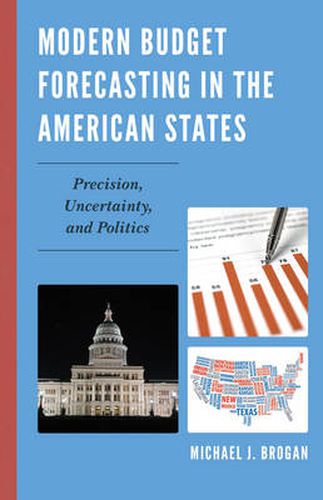Readings Newsletter
Become a Readings Member to make your shopping experience even easier.
Sign in or sign up for free!
You’re not far away from qualifying for FREE standard shipping within Australia
You’ve qualified for FREE standard shipping within Australia
The cart is loading…






This title is printed to order. This book may have been self-published. If so, we cannot guarantee the quality of the content. In the main most books will have gone through the editing process however some may not. We therefore suggest that you be aware of this before ordering this book. If in doubt check either the author or publisher’s details as we are unable to accept any returns unless they are faulty. Please contact us if you have any questions.
This book, by Michael J. Brogan, examines government budgeting through the lens of public budget forecast errors. In examining this aspect of the budgetary process, Brogan helps readers understand levels of political and financial risk that policymakers are willing to accept in estimating the likelihood of accurate budget projections. This title is noteworthy in its innovative, accessible approach to examining the budget process through an analysis of forecast errors. Unlike most public budgeting books, which focus primarily on the technical aspects of budgeting or on the politics of the budget process, this book bridges the technical and political aspects of budgeting, thereby providing a more comprehensive analysis of contemporary issues and research in public budgetary matters.
In light of the current financial crisis in the United States, this book is crucial for providing readers with a comprehensive review of the limits of budget projections and how political forces shape the forecasting process. Throughout the text, readers are presented with relevant state-specific mini cases. The mini cases highlight some of the difficulties in projecting future revenue and spending patterns, as well as the political conflict that can ensue. The empirical findings, mini cases, and arguments presented throughout this book are intended to empower readers, giving them the expertise needed to better understand how uncertainty in public budget forecasts affects the budget process. Ultimately, this knowledge can help citizens connect the financial management of a state with its governing patterns.
$9.00 standard shipping within Australia
FREE standard shipping within Australia for orders over $100.00
Express & International shipping calculated at checkout
This title is printed to order. This book may have been self-published. If so, we cannot guarantee the quality of the content. In the main most books will have gone through the editing process however some may not. We therefore suggest that you be aware of this before ordering this book. If in doubt check either the author or publisher’s details as we are unable to accept any returns unless they are faulty. Please contact us if you have any questions.
This book, by Michael J. Brogan, examines government budgeting through the lens of public budget forecast errors. In examining this aspect of the budgetary process, Brogan helps readers understand levels of political and financial risk that policymakers are willing to accept in estimating the likelihood of accurate budget projections. This title is noteworthy in its innovative, accessible approach to examining the budget process through an analysis of forecast errors. Unlike most public budgeting books, which focus primarily on the technical aspects of budgeting or on the politics of the budget process, this book bridges the technical and political aspects of budgeting, thereby providing a more comprehensive analysis of contemporary issues and research in public budgetary matters.
In light of the current financial crisis in the United States, this book is crucial for providing readers with a comprehensive review of the limits of budget projections and how political forces shape the forecasting process. Throughout the text, readers are presented with relevant state-specific mini cases. The mini cases highlight some of the difficulties in projecting future revenue and spending patterns, as well as the political conflict that can ensue. The empirical findings, mini cases, and arguments presented throughout this book are intended to empower readers, giving them the expertise needed to better understand how uncertainty in public budget forecasts affects the budget process. Ultimately, this knowledge can help citizens connect the financial management of a state with its governing patterns.